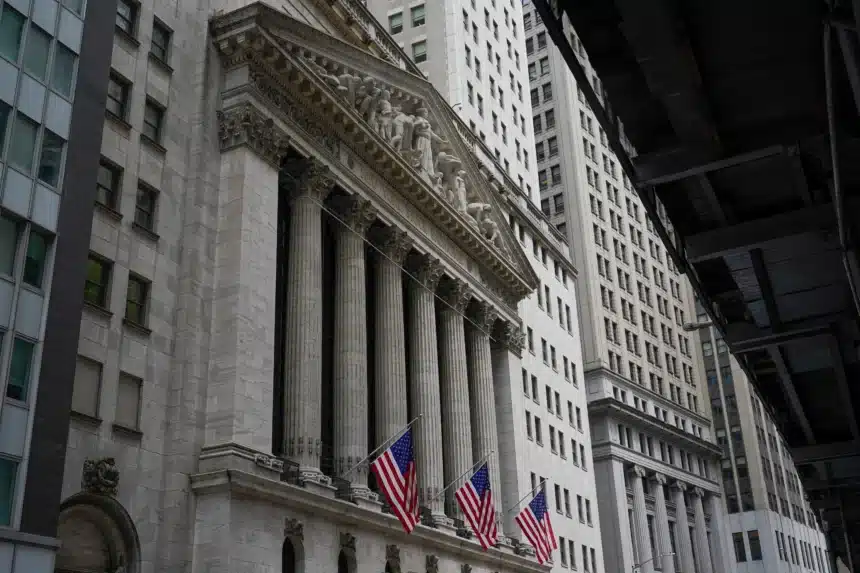Stocks ended the day mixed. The major indexes had their fourth consecutive winning week as the holiday-shortened week came to an end on Friday following a half-day trading session.
The S&P 500 steadily increased by 0.1% after fluctuating throughout the day between modest gains and losses. The Nasdaq composite fell by 0.1% while the Dow Jones Industrial Average increased by 0.3%.
The S&P 500 gained 2.72 points overall to close at 4,559.34. The Nasdaq dropped 15 points to 14,250.85, while the Dow increased 117.12 points to 35,390.15.
Markets returned on Thursday after the Thanksgiving holiday, although trading was light. Profits in the energy, banking, healthcare, and other sectors offset losses in the equities of technology and communication services.
With losses of 1.9% and 1.3%, respectively, chipmaker Nvidia and parent company Alphabet of Google were two of the largest decliners. Best Buy closed 2.2% higher while CF Industries gained 2.6%, making them two of the S&P 500’s biggest gainers.
The most recent weekly advances in the main stock indices show that, after a three-month decline, market mood turned around in November. A cautious optimism has arisen among traders that the Federal Reserve will eventually stop its jaw-dropping rate hikes because inflation has decreased enough.
Predictions regarding a possible recession have been moderated and pushed back until 2024. The economy is largely booming, consumer spending is stable, and the rate of inflation is still declining. This has raised speculations and hopes that the Federal Reserve would even think about lowering interest rates.
However, Fed officials have stated that they will base their next rate decisions on incoming data and that the economy’s prognosis is still uncertain. Next week, when the government delivers its October report for a crucial inflation metric that the Fed tracks, the Fed will receive another significant update.
Treasury yields on the bond market increased on Friday. Mortgage and other loan interest rates are influenced by the yield on the 10-year Treasury, which increased to 4.47% from 4.41% late on Wednesday. Late on Wednesday, the yield on the 2-year Treasury increased from 4.90% to 4.95%.
A major contributor to inflation, oil prices continued to decline on Friday, with U.S. crude falling 2%. Recent weeks have seen a sharp decline in oil prices due to concerns about an imbalance between the supply and demand of crude oil.
With mounting concerns that purchasing may decline due to pressure from shrinking savings, rising credit card debt, and inflation, investors are keeping an eye on how American retailers will fare as the Christmas shopping season begins with Black Friday.
The most recent quarterly results from a number of stores, including Saks Fifth Avenue, Best Buy, and Walmart, indicated that consumer appetites for spending are waning even as inflation is declining and employment is still strong.
In Europe, shares were mostly higher. The Paris CAC 40 gained 0.2%, and Germany’s DAX gained 0.2 points. The FTSE 100 in Britain gained 0.1%.
Asian markets had a mixed finish. Tokyo’s Nikkei 225 gained 0.5% following news that consumer inflation in Japan increased for the first time in four months, led by sharp increases in hotel and food costs due to the country’s booming tourism industry. The consumer price index increased 3.3% in October compared to the same month last year, up from 3% in September. This trend defied the Bank of Japan’s predictions that price pressures would lessen by the end of the year.
Higher-than-expected inflation is a worry for the BOJ and the government alike, according to ING Economics’ Robert Carnell and Min Joo Kang. According to them, this will probably force the central bank to modify its very loose monetary policy in January.
Following recent advances, anticipation of increased government support for indebted property developers caused shares in China to decline. One of the largest, Country Garden, saw its shares fall 7.6% after rising 16% the previous day.
The Shanghai Composite index dropped 0.7% and the Hang Seng plunged 2% in Hong Kong.
In other Asian news, Australia’s S&P/ASX 200 increased by 0.2% while South Korea’s Kospi fell by 0.7%.









